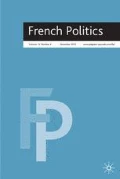This issue perhaps more than any others touches upon current challenges and contemporary problems that affect politics and its study not only in France but across the globe. Our annual roundtable taken this time from the French Political Science Association meetings in Lille in 2022, edited by Laurie Beaudonnet and Claire Dupuy, focuses on the “meanings and practices” of the internationalization of political science at French-speaking universities in Belgium by Jérémy Dodeigne, France by Fabienne Greffet, Switzerland by Oscar Mazzoleni and Quebec by Laurence Behrer. That this roundtable discussion took place at a meeting in France and is being published in this highly international venue is a testimony of the ever-growing international dimension of Political Science in francophone countries in general.
The research article by Shelly Boulianne and Sangwon Lee tackles internationalization through the lens of protest over social media in France, the UK, Canada and the US—a recent emerging and increasingly widespread phenomenon. The data and measures contribution for this issue by Umberto Sconfienza and Frédéric Durand provides useful insight into how to conduct a network discourse analysis of twitter in the case of the emerging nuclear debate in the 2022 presidential campaign. As such, both of these articles contribute crucial methodological, empirical and theoretical insight into the impact and use of social media platforms in political life, an ever-present dynamic in democratic performance across the globe. Finally, the review article by Jean-Paul Daoust conducts a fascinating analysis of how contemporary democratic governance can take-on compliance in times of crisis in the specific case of the COVID 19 pandemic. Thus, taken together these articles covering political issues in 7 different countries strengthen knowledge and understanding about the global dimensions of politics in this politically challenging and rapidly changing era well beyond the borders of France.
The French Politics—AFSP group panels at next Fall’s American Political Science Meetings in Los Angeles, presented at the end of the issue in the FPG news section, also reflect this highly international network of researchers that places France and francophones politics in an international, comparative and global perspective. The author meets critic’s roundtable promotes a Franco-American dialog on a book on elections administration in the USA. The panel on intersectionality brings together scholars from Brazil, the USA, Quebec, France and Belgium to show cutting-edge intersectional research on France and other countries in a comparative perspective. The pre-conference short course on Gender Equality Machineries, takes the well-established French tradition of women’s rights ministries and state feminism and provides an arena for 13 leading scholars to discuss the emerging comparative research agenda on these state-based machineries on a global level.
As always, my gratitude goes out to the contributors and reviewers who worked hard on this issue, in particular to Claire Dupuy and Laurie Beaudonnet for their leadership on the internationalization roundtable, to Michael Lewis-Beck and Isabelle Guinaudeau for their editorial contributions as well as the Sumathi Ratnabai and his production team at Springer. I hope you enjoy the lessons learned about the study of these contemporary global challenges as much as I did and look forward to your comments, feedback and criticisms.
Author information
Authors and Affiliations
Corresponding author
Additional information
Publisher's Note
Springer Nature remains neutral with regard to jurisdictional claims in published maps and institutional affiliations.
Rights and permissions
About this article
Cite this article
Mazur, A.G. Editor’s note. Fr Polit 21, 129–130 (2023). https://doi.org/10.1057/s41253-023-00209-0
Accepted:
Published:
Issue Date:
DOI: https://doi.org/10.1057/s41253-023-00209-0

